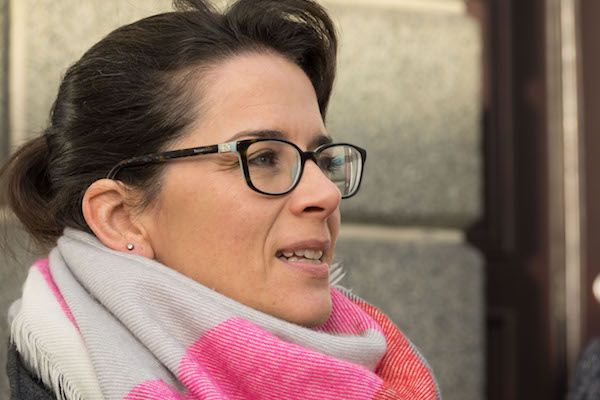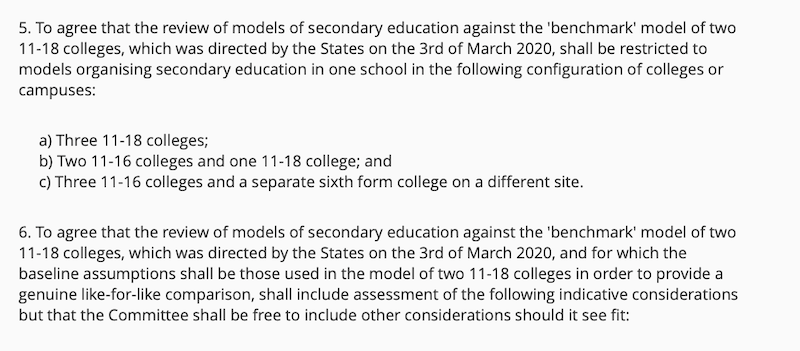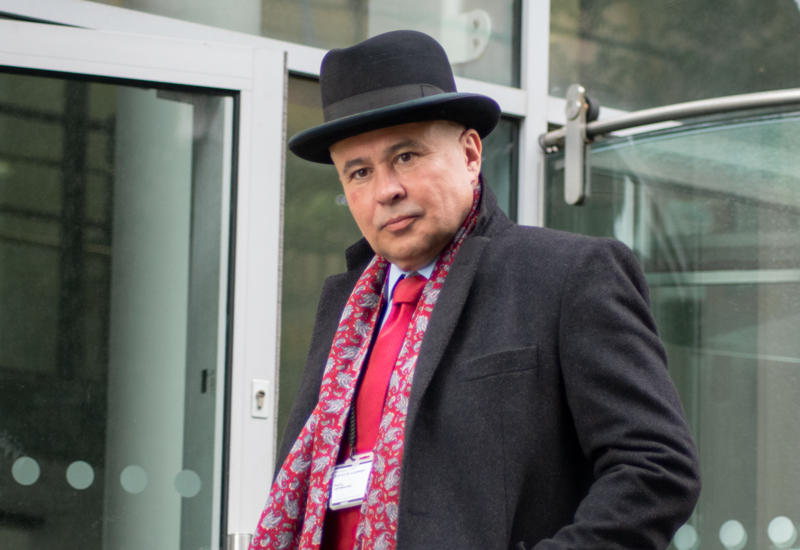


The Education President has vowed to explain her committee's plans for the final stages of the secondary school review in more detail before asking the States to throw out all the outstanding resolutions it has inherited.
Deputy Andrea Dudley-Owen has made the commitment following political concerns that wiping the slate clean without setting a new direction of travel would create a policy vacuum.
Earlier this month, the committee revealed its intention to "clear the decks" by ridding itself of the decisions made in previous debates on the future of secondary education.
This includes scrapping the previously-agreed terms of the 'pause and review', which stipulated the educational models that should be worked up on a like-for-like basis.
By doing so, the committee argues it will then have the clean slate it needs to "take ownership" of the review, which it wants to benchmark against the current four-school system, instead of using the currently-paused one-school model as the baseline.

Pictured: If the States agrees with ESC's request, the terms of last March's pause and review will fall away.
When the committee released its policy letter - which we now know will be debated as part of a States-wide clearance of unwanted extant resolutions - it was not in a position to explain its plans in more detail.
Asked if her committee would commit to revealing those plans in advance of the 17th March States meeting, so that colleagues understand what they are voting on and the public can provide feedback to their deputies, Committee President Andrea Dudley-Owen replied: "Yes, the Committee will be providing more detail about our plans for the final stages of the review in advance of the States debate on the Government Work Plan."
"As I’ve repeatedly said, given the previous lack of engagement with secondary staff, it is very important that they hear from us first and we are ensuring that happens."
"At this time all staff are understandably focused on the priority of our emergency response to the Covid second wave and ensuring that our children can continue to learn. We are tailoring our engagement around this."

Pictured: Feedback from secondary school teachers will play a key part in the final stages of the review.
Publishing more details about its plans will be critical to ESC's chances when it takes its proposals to the States on 17 March.
In the last States meeting, Deputy Dudley-Owen came under fire from political colleagues for refusing to answer questions about whether the 'pause and review' terms agreed by the Assembly would be fulfilled. A transcript of that Q&A can be found HERE.
Scrutiny President Yvonne Burford, who led those questions, said ESC "are completely within their rights to ask the Assembly to rescind resolutions - what matters now is what they plan to put in their place."
"The States is at liberty to debate to rescind resolutions. In fact, if a Committee want to take a different path then that is the correct way to go about it. But I hope we will also be told in detail what it is proposed be put in their place beforehand."
Deputy Lindsay de Sausmarez also emphasised the importance of this in comments made on social media.
"As a parent of one of the many kids in the current holding pattern, my main concern is the risk of an indefinite policy void," she said. "ESC are well within their rights to tell us what they don't want to do - as long as they also tell us what they do want to do instead."

Pictured: Deputy Carl Meerveld, a signatory of the original 'pause and review' requete, described the recent questioning of Deputy Dudley-Owen in the States as an "ambush".
Deputy Carl Meerveld described the protracted questioning of the ESC President in the States as a "political ambush" by deputies who knew Deputy Dudley-Owen was not in a position to speak publicly about her committee's plans.
"It was a political witch-hunt reminiscent of what used to happen in the previous States, which is very regrettable," he said.
Deputy Meerveld views ESC's actions as "an eminently sensible" way forward and questioned what more the committee could do.
"From a political position, by saying let’s rescind these resolutions, which biased the review’s focus, it is the right thing to do. But more importantly by engaging with stakeholders, with the people who are actually going to be delivering this, which was a failure of the previous proposals."
"The previous States cannot bind the future States," he continued. "Some issues will drive the election cycle and if there was a message from the last election, it was that a majority of people favoured a three-school model over the two-school model."
Deputy Peter Roffey, a member of the previous committee that proposed that model, challenged his successors to “come up with a better way forward and I will happily throw away the current roadmap."
However, until that happens, he suggested that all that's achieved by rescinding States policy is "to take us back virtually to square one, more than a decade after this journey began."
"It exacerbates the damaging uncertainty which has existed for far, far too long," he said.
"It was Deputy Dudley-Owen herself who stressed repeatedly last year that selecting a way forward without an exhaustive, like for like, comparison of the option was "bad governance".
"To move away from the current policy is fine but to do so without comparing it with any alternatives which may emerge in the months ahead would be rank bad governance. I really worry that we may find we have no agreed way forward for a long time to come.
"I have no doubt the current ESC will produce proposals in due course but if they are not supported and we have rescinded all the previous decisions, we will be in a complete policy vacuum. This proposal to rescind really is putting the policy cart before the policy horse."
Pictured top: Education, Sport & Culture President Andrea Dudley-Owen.
Comments
Comments on this story express the views of the commentator only, not Bailiwick Publishing. We are unable to guarantee the accuracy of any of those comments.